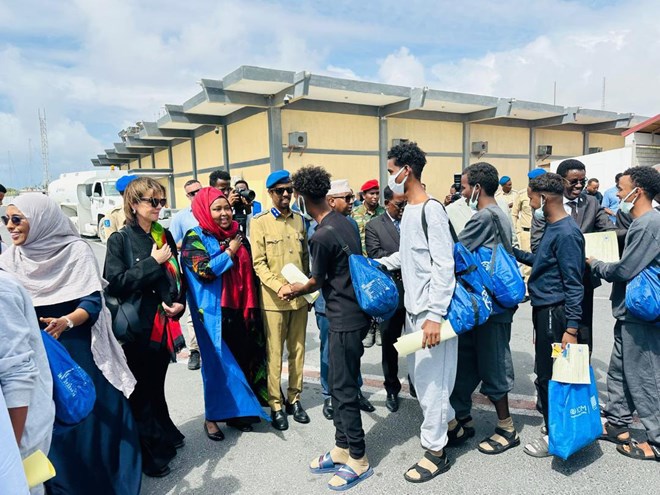
Friday October 25, 2024

Somali officials and representatives from the International Organization for Migration (IOM) welcome a group of Somali returnees at Mogadishu's Aden Adde International Airport. The 164 returnees had been stranded in Libya and were successfully repatriated as part of Somalia's ongoing efforts to assist its citizens trapped in conflict zones and dangerous migration routes.
Mogadishu (HOL) — Somalia has successfully repatriated 164 citizens from Libya, bringing them back to Mogadishu on Thursday.
Upon arrival, the returnees were welcomed by government officials, including Minister of Petroleum and Mineral Resources Abdirizak Mohamed and Minister of Internal Security Abdullahi Sheikh Fartaag,
The operation, led by Foreign Minister Ahmed Moalim Fiqi, involved collaboration with the European Union (EU), the International Organization for Migration (IOM), and the United Nations High Commissioner for Refugees (UNHCR).
Of the returnees, 55 were sent to Hargeisa, while 109 arrived in the capital.
Minister Fiqi spoke on the significance of this repatriation, stating, "This is an important step in ensuring the safety and future of our citizens."
Many left Somalia seeking safety and opportunity, only to become victims of human trafficking networks, commonly referred to as "Magafe." These traffickers exploit vulnerable migrants with false promises of safe passage to Europe.
Stranded in cities like Tripoli, many migrants faced brutal conditions at the hands of traffickers, enduring torture, extortion, and starvation. Reports from various sources detail the horrific violence encountered in detention centers, where victims are treated as commodities, with lives disregarded.
The returnees recounted their harrowing experiences in Libyan prisons, known for mistreating migrants. "I am happy to be back in my home country of Somalia. We hope to improve our lives here," said one young returnee. "I advise Somali youth to avoid going to foreign countries like Libya, where we suffered greatly."
Libya has become a key transit hub for Europe-bound migrants fleeing conflict and poverty from sub-Saharan Africa. Currently, over 700,000 migrants reside in Libya, a situation exacerbated by instability since the overthrow of Muammar Gaddafi in 2011. The ongoing instability has worsened the situation, increasing the risks of kidnapping and exploitation.
Despite recent rescue operations, thousands of migrants remain trapped. Reports indicate that Libyan security forces rescued around 200 individuals from traffickers, revealing severe signs of abuse. Yet, human trafficking networks continue to thrive, and many migrants suffer under constant threats of violence.
Many of the returnees struggle to restart their lives upon their return.
The Somali government and the International Organization for Migration (IOM) have been actively engaged in repatriating citizens stranded in Libya. Nearly 100 Somali nationals were returned to Mogadishu on October 24, 2023. More recently, Libyan security forces rescued approximately 200 migrants in May 2024, including many Somalis, from a trafficking group in the southeastern town of Kufra.
Many of these individuals had been held for up to seven months under horrific conditions, enduring torture and starvation. Earlier, in the same month, at least 107 migrants, including women and children, were freed from captivity in southeast Libya. Reports indicate that these migrants faced severe abuse, with some showing signs of torture and gunshot wounds.
The ongoing crisis has led to increased international attention as human rights organizations spotlight the need for urgent action to protect vulnerable migrants trapped in Libya's detention centers.